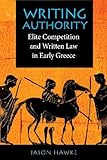Writing Authority : Elite Competition and Written Law in Early Greece / Jason Hawke.
Material type: TextPublisher: Ithaca, NY : Cornell University Press, [2021]Copyright date: ©2011Description: 1 online resource (294 p.)Content type:
TextPublisher: Ithaca, NY : Cornell University Press, [2021]Copyright date: ©2011Description: 1 online resource (294 p.)Content type: - 9781501758164
- Greek language -- Writing
- Justice, Administration of (Greek law)
- History
- Legal History & Studies
- HISTORY / Ancient / Greece
- written law in ancient Greece, traditional Greek sources of authority, emergence of Greek law, Greek attitudes about law and authority, Greek legal culture in the eighth through early sixth centuries B.C.E
- 347.38 23
- KL4345 .H39 2011eb
- online - DeGruyter
| Item type | Current library | Call number | URL | Status | Notes | Barcode | |
|---|---|---|---|---|---|---|---|
 eBook
eBook
|
Biblioteca "Angelicum" Pont. Univ. S.Tommaso d'Aquino Nuvola online | online - DeGruyter (Browse shelf(Opens below)) | Online access | Not for loan (Accesso limitato) | Accesso per gli utenti autorizzati / Access for authorized users | (dgr)9781501758164 |
Browsing Biblioteca "Angelicum" Pont. Univ. S.Tommaso d'Aquino shelves, Shelving location: Nuvola online Close shelf browser (Hides shelf browser)

|

|

|

|

|

|

|
||
| online - DeGruyter With Light Steam : A Personal Journey through the Russian Baths / | online - DeGruyter Wives, Slaves, and Concubines : A History of the Female Underclass in Dutch Asia / | online - DeGruyter Women and the Birth of Russian Capitalism : A History of the Shuttle Trade / | online - DeGruyter Writing Authority : Elite Competition and Written Law in Early Greece / | online - DeGruyter Yankees in Petrograd, Bolsheviks in New York : America and Americans in Russian Literary Perception / | online - DeGruyter Years of Plenty, Years of Want : France and the Legacy of the Great War / | online - DeGruyter Morbid Undercurrents : Medical Subcultures in Postrevolutionary France / |
Frontmatter -- CONTENTS -- Preface -- 1-LAW, JUSTICE, AND LEGISLATION IN EARLY GREECE -- 2-APPROACHES TO EARLY GREEK LEGAL THOUGHT AND PRACTICE -- 3-LEGAL CULTURE IN GREECE BEFORE WRITTEN LAW -- 4-JUDICIAL EQUALITY, LITERACY, AND WRITTEN LAW -- 5-ELITES AND THE WORLD OF THE EMERGING POLIS -- 6-ARISTOCRATIC ANXIETIES AND THE WRITING OF LAWS -- 7 -CONCLUSION: Writing and Authority -- Notes -- Bibliography -- Index
restricted access online access with authorization star
http://purl.org/coar/access_right/c_16ec
In Writing Authority, Hawke argues that the rapidly changing political and economic landscape of early Greece prompted elites to begin committing laws to written form. The emergence of the polis and its institutions, the demographic growth of Greece, the development of market forces, and the commoditization of wealth all presented new challenges and difficulties for the Greeks of the eighth and seventh centuries B.C.E. Hawke contends that no one felt the attendant anxieties of these changes more acutely than the leading members of early Greek communities—they confronted regulating their intense competition for status and power in an environment where traditional sources of authority, such as Homeric epic, offered no ready solutions for problems arising from the transformation of Greek society. Greek elites enshrined in writing rules aimed at stabilizing their relationships with one another and, by extension, their communities. Challenging both established and emerging orthodoxies about the appearance of written law in ancient Greece, Writing Authority questions the importance of a popular or communal role in the earliest Greek legislation. Approaches from anthropology, legal studies, and sociology are used to situate the emergence of Greek law in the broader context of Greek legal culture in the eighth through early sixth centuries B.C.E. as Hawke describes in rich detail the legal culture of Homer's world, considers the impact of literacy on Greek attitudes about law and authority and its practical consequences for the governing of the Greek polis, and examines the effects of the tumultuous changes in Archaic Greece on the leading members of Greek communities. The result is a compelling monograph that provides an exhaustive and nuanced history of earliest Greek law and the motivations of the elites that brought it into being. It will be of interest to scholars of Greek history, classicists, and early legal historians.
Mode of access: Internet via World Wide Web.
In English.
Description based on online resource; title from PDF title page (publisher's Web site, viewed 02. Mrz 2022)


